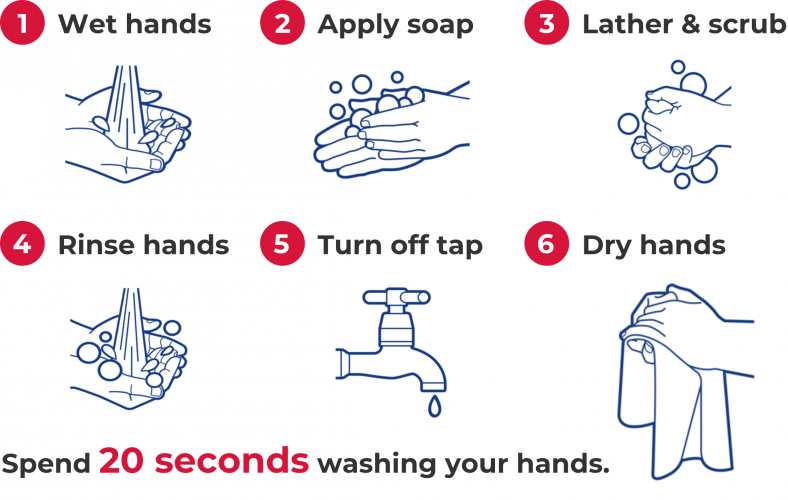Practising good hygiene
Coronavirus (COVID-19) can survive on some surfaces for a few hours, but can survive on others for up to several days. With good personal hygiene, cleaning and disinfection, the virus can be killed.
Personal hygiene
These simple steps can help to protect yourself and the community.
- Clean your hands with soap and water for 20 seconds, or use an alcohol-based hand sanitiser.
- Cover your nose and mouth with a tissue when coughing and sneezing or use your elbow, not your hands.
- Avoid close contact with people unwell with cold or flu-like symptoms, and stay home if you have symptoms.
- Avoid touching your face and avoid shaking hands with others.
- Try to maintain a distance of 1.5 metres from others and avoid crowded places.
Remember, when washing your hands, all you need is water and soap, body wash or shampoo. It doesn’t need to be expensive, or ‘antibacterial’.
The key to handwashing is to wash often and wash well, for at least 20 seconds.

Household hygiene
As well as regular handwashing, cleaning and disinfecting surfaces in your home can help stop the spread of COVID-19.
Hand sanitiser safety
Alcohol-based hand sanitiser is dangerous if ingested, particularly for children. Follow these safety tips.
- Store hand sanitiser products safely and out of reach of children.
- Adults must supervise young children when applying alcohol-based hand sanitiser.
- Be aware of imported products which may not be clearly labelled and may contain more toxic alcohols such as methanol.
- Washing hands with soap and water for at least 20 seconds is a safe and effective option.
- At temperatures above 40°C for extended periods of time, there is a higher risk of the alcohol content of hand sanitiser evaporating, so keep hand sanitiser out of the sun and don’t leave it in a hot car.
- If you suspect your child has ingested hand sanitiser, regardless of the quantity, call the 24-hour Poisons Information Centre on 13 11 26 for first aid and monitoring advice. Have the container of the ingested product with you.
Detergent or disinfectant?
- Detergents help remove germs, dirt and impurities from surfaces but they do not kill germs.
- Disinfectants kill viruses and bacteria but don’t remove them from a surface.
Using a detergent, then a disinfectant helps lower the risk of spreading infection.
Alternatives to disinfectant
For hard, non-porous surfaces, a diluted household bleach solution can be used in a ratio of four teaspoons of bleach, per one litre of water.
Never mix household bleach with ammonia or any other cleaner. You need to check the product is not past its expiration date, which makes it ineffective. Make sure the area is well ventilated during and after cleaning.
People living in flats, apartments and units
If you live in an apartment, there are steps you can take to minimise your exposure to COVID-19 if there is community transmission.
- Clean your hands with soap and water for 20 seconds or use an alcohol-based hand sanitiser after touching any frequently touched surfaces in common areas, like door handles, or communal washing machines and dryers.
- Cover your nose and mouth with a tissue when coughing and sneezing or use your elbow.
- Avoid close contact with people who have cold or flu-like symptoms.
- Avoid touching your face and avoid shaking hands with others
- Try to maintain a distance of 1.5 metres from others as much as possible in your apartment block, such as in elevators, stairwells or hallways.
- Do not visit your neighbours or gather in groups in common areas such as rooftops or courtyards.
Strata managers and body corporates
- Regularly clean frequently touched surfaces in common areas with a detergent followed by disinfectant, or use detergent and disinfectant wipes
- Consider providing adequate alcohol-based hand sanitiser for residents to use.
SOURCE:
NSW HEALTH |
https://www.nsw.gov.au/covid-19/health-and-wellbeing/practising-good-hygiene


